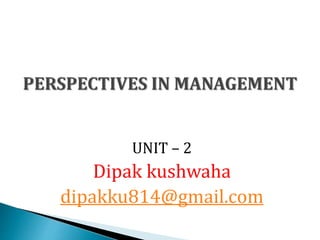
Early Development of Management Thought and Classical Perspectives
- 1. UNIT – 2 Dipak kushwaha dipakku814@gmail.com
- 2. Early Development Classical Perspective: Scientific Management, Administrative Management and Bureaucracy Behavioral Perspective: Hawthorne Studies, Human Relations Movement and Emergence of organizational behavior Quantitative Perspective: Management Science and Operations Management Integrating Perspective: Systems and Contingency Perspectives Emerging management issues and challenges
- 3. The practice of management can be tracked back to 2500 B.C. But was not given much importance until the late 1800s. Formal organizations like Roman and Greek armies for the massive construction of masterpieces like Egyptian Pyramid and The Great Wall of China. Industrial Revolution
- 5. British Industrialist Manager of a textile mills in Scotland Emphasized on Cooperation between management and workers Contributed in HRM Investment in HR is profitable than physical resources System of feedback and motivation
- 6. Professor of Mathematics at Cambridge University Pioneer of operations research and industrial engineering Emphasized on Profit sharing and participative decisions Decisions should be based upon investigation and facts rather than intuition and opinion
- 7. President of ‘Yale and Towne’, a lock manufacturing company Emphasized on Better Management of Business Essentials of skills and qualities Organized effort to pool the accumulated knowledge
- 8. Manager of an army arsenal Emphasized on Improvement of administration Administration should be evolved from observation and experience Preparation, Communication and Implementation
- 9. Scottish Economist, Philosopher and Author The Father of Economics Emphasized on division of labor To increase productivity, save time lost in changing tasks and labor- saving inventions
- 10. American industrialist and the founder of Ford Motor Company Emphasized on mass production Production at a high volume and low cost Breaking down tasks into the smallest components
- 11. It is the initial stage of the development of management thought. It focuses on efficiency and recommends that managers continuously try to increase organizational efficiency to increase production. It includes three approaches to management which are compatible and complementary to each other (Scientific Management Theory, Administrative Management Theory and Bureaucratic Management Theory)
- 12. It is an attitude and philosophy that discards the traditional method of hit and miss, rule of thumb and trial and error of managing work and workers. It includes research, investigation, experiment, collection of data, data analysis and formulation of certain principles to solve organizational problems for goal achievement. It ensures that all the activities of an organization are performed in an economic and effective manner.
- 13. Frederick Winslow Taylor (1856- 1915) He is also known as the ‘Father of Scientific Management’. He published his books ‘Principles of Scientific Management’ in 1911 that includes his philosophies and ideas. He believed that there is a science for doing each job. He saw productivity as the answer to both higher wages and higher profits. Piece- rate system
- 14. Management principles are the statements of fundamental truth, which provide guidance for management system. Scientific management is the application of scientific methods of study and analysis to solve management problems. Taylor developed a number of principles such as:
- 15. 1. Science, not rule of thumb 2. Harmony, not discord It emphasizes on the requirement of scientific study and analysis of information before taking any decision or action. It involves observation and analysis of each unit of work, determination of standard of work and the assurance of work being done in the best possible way. Harmony focuses on the unity of action and discord means difference in approach. There should be absolute harmony between management and workers to maintain unity in action. Coordination must be developed.
- 16. 3. Cooperation, not individualism 4. Development of each person to his maximum efficiency and prosperity It emphasizes on the fact that organization’s objectives are above an individual’s personal objectives. The achievement of organizational objectives should fulfill the individual objectives of employees. Management has to take necessary steps to develop efficiency and capabilities of workers. Provision of training, seminar, workshop, interaction, discussion, further education and other efficiency development activities should be made.
- 17. 5. Maximum output in place of restricted output 6. Equal division of responsibility It is essential to produce maximum output on the basis of level of capacity. It also ensures maximum wage to workers and maximum profit to the owners. It is essential for the promotion of workers, owners and also the society at large. Equal division of responsibility between managers and workers should be done on the basis of level assigned. Managers are involved in executive works and workers are involved in implementation activities.
- 18. 7. Mental revolution of both management and workers There should be mutual support and cooperation. Managers and workers should value each other. If the relationship between managers and workers is in harmony, the working environment is identified as good
- 19. Lillian Gilbreth- First Lady of Management Main Concern: Economy of movement Work simplification Use of Flow Charts Study of worker fatigue Application of POM to improve organizational performance
- 20. Father of Office Management Planning the work Scheduling the work Executing the work Measuring the work Rewarding the work
- 21. Guaranteed Day Rate (minimum wage) Provision of bonus if task is completed beforehand Use of work scheduling chart (GANTT CHART) Attention to service rather than profits
- 22. Optimum use of resources Minimization of cost of production Develop workers’ efficiency Greater economic prosperity Emphasis on training and development
- 23. Too much emphasis on technical aspects in comparison to human interest. Workers viewed as economic beings. Employees should monotonously work on the same task. Workers/ Laborers are not allowed to take the initiative. Psychological and sociological aspects of work are not considered.